|
MAY 10: GRANT ASSAULTS LEE'S LINE
Grant planned a massive assault at five o'clock in the afternoon
across Lee's entire line in hopes of overwhelming the Confederates. The
scheme began to unravel around 2:00 P.M., when Hancock returned to the
Po to help extricate Barlow. Hancock's departure left Warren in charge
of the Laurel Hill sector. The Fifth Corps commander was still smarting
from earlier reverses and was anxious to redeem his reputation. As soon
as Hancock left, he petitioned Meade for permission to attack Laurel
Hill right away, unsupported and before the scheduled five o'clock
advance. For reasons that have never been explained, Meade consented to
Warren's request.
At about 4:00 P. M., Warren led elements from the Second and Fifth
Corps against Laurel Hill. A witness summarized the results. "Some
portions of the corps advanced to the abatis, others halted part way
and discharged a few volleys, but speedily the whole line fell back with
terrible loss." A few units elbowed through smoldering cedars only to
become mired in a freshly plowed field. "How we got through it all I
don't know," a Union survivor reminisced.
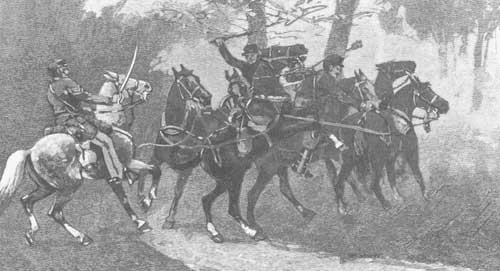
|
IN ITS RETREAT TO THE PO RIVER, ONE GUN OF CAPTAIN WILLIAM A. ARNOLD'S
BATTERY A, FIRST RHODE ISLAND LIGHT ARTILLERY, BECAME WEDGED BETWEEN TWO
TREES AND HAD TO BE ABANDONED. IT WAS THE FIRST GUN EVER LOST BY THE
SECOND CORPS. (FROM WARREN GOSS, RECOLLECTIONS OF A PRIVATE)
|
Grant had no choice but to postpone the grand assault until Warren
could reconstitute his formation. Word of the delay, however, apparently
never reached Brigadier General Gershom Mott, and at 5:00 P.M. he
charged alone toward the tip of the Confederate salient. "On reaching
the open field," one of his officers reported, "the enemy opened his
batteries, enfilading our lines and causing our men to fall back in
confusion."
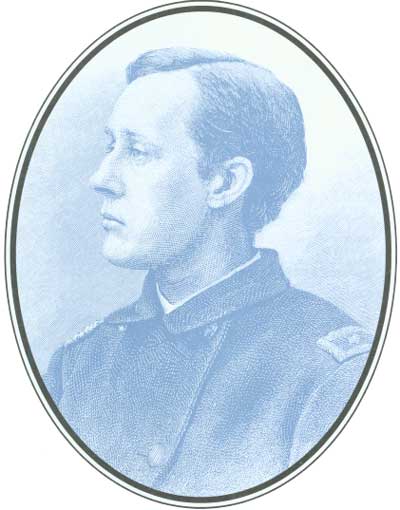
|
JUST 29 YEARS OLD IN 1864, FRANCIS BARLOW LOOKED MORE LIKE "A HIGHLY
INDEPENDENT MOUNTED NEWSBOY" THAN A MAJOR GENERAL. HANCOCK WOULD SELECT
HIM TO LEAD THE MAY 12 ASSAULT ON THE MULESHOE. (BL)
|
|
WAITING TO ATTACK
In his efforts to find a weak spot in Lee's defenses, Grant ordered a
series of attacks against the Confederate line on May 10. By far the
most successful of these ventures was an attack led by Colonel Emory
Upton of the Sixth Corps. Just before sundown, Upton led 5,000 men in a
charge against the western face of the Muleshoe salient, overrunning
the Confederate line and taking some 1,000 prisoners. The 121st New
York Volunteers, a regiment Upton had commanded earlier in the war, was
in the first line of battle. Clinton Beckwith, an officer in the
regiment, described the tension in the ranks as the time of attack
approached.
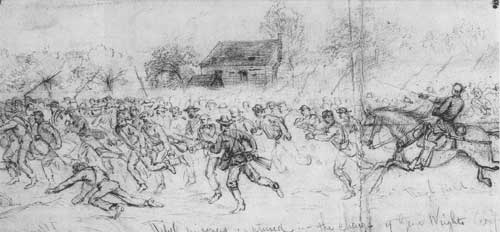
|
CONFEDERATE SOLDIERS CAPTURED IN UPTON'S ATTACK WERE RUN BACK INTO UNION
LINES NEAR THE SHELTON HOUSE. FROM THERE, THEY WENT TO POINT LOOKOUT,
MARYLAND, AND OTHER PRISON CAMPS IN THE NORTH. (LC)
|
"About 5 P.M. we moved over the works down into the woods, close up
to our skirmishers (the 65th N.Y.), who were keeping up a rapid fire,
and formed in line of battle. Regiment after regiment came up and formed
in line, we being in the first or front line and the right of the column
. . . . The Rebel rifle pits were about two hundred and fifty yards in
front of our skirmish line. They had no skirmishers out, ours having
driven them in, but they were firing from their breastworks, on top of
which they had logs to protect their heads. Our batteries (one on the
right and three in the rear of us) were belching away at them, and they
were answering but feebly. Occasionally the hum of a bullet and the
screech of a shell gave notice that they were on the qui vive.
As soon as we were formed Colonel Upton, Major Galpin and the
Adjutant came along and showed to the officers and men a sketch of just
how the Rebel works were located, and we were directed to keep to the
right of the road which ran from our line direct to theirs . . . . We
were ordered to fix bayonets, to load and cap our guns and to charge at
a right shoulder shift arms. No man was to stop and succor or assist a
wounded comrade. We must go as far as possible, and when we broke their
line, face to our right, advance and fire lengthwise of their line.
Colonel Upton was with our regiment and rode on our right. He instructed
us not to fire a shot, cheer or yell, until we struck the works. It was
nearly sundown when we were ready to go forward. The day had been bright
and it-was warm but the air felt damp, indicating rain. The racket and
smoke made by the skirmishers and batteries, made it look hazy about us,
and we had to raise our voices to be heard. We waited in suspense for
some time. Dorr Davenport, with whom I tented, said to me, 'I feel as
though I was going to get hit. If I do, you get my things and send them
home.' I said, 'I will, and you do the same for me in case I am shot,
but keep a stiff upper lip. We may get through all right.' He said, 'I
dread the first volley, they have so good a shot at us.' Shortly after
this the batteries stopped firing, and in a few minutes an officer rode
along toward the right as fast as he could, and a moment afterward word
was passed along to get ready, then 'Fall in,' and then 'Forward.' I
felt my gorge rise, and my stomach and intestines shrink together in a
knot, and a thousand things rushed through my mind. I fully realized
the terrible peril I was to encounter. I looked about in the faces of
the boys around me, and they told the tale of expected death. Pulling my
cap down over my eyes, I stepped out. . . ."
|
Sometime after six o'clock, the Sixth Corps launched its phase of the
attack, led by Colonel Emory Upton and a select force of twelve
regiments. Upton quietly assembled his troops at the edge of the woods
across from the salient's western leg and instructed them to charge
without pausing to fire or load. His front line was to breach the works
and then spread right and left along the Rebel trenches, widening the
cleft, and his remaining units were to consolidate the gains.
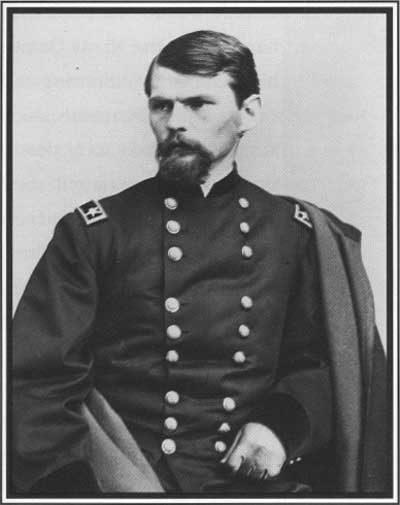
|
RESPONSIBILITY FOR THE SIXTH CORPS' MAY 10 ATTACK ON THE MULESHOE FELL
TO TWENTY-FOUR-YEAR-OLD EMORY UPTON. (LC)
|
A volley spewed from the Rebel works, then another. Gaps appeared
in Upton's formation, but the men kept on, clawing through the abatis
and over the entrenchments.
|
Union artillery pounded the Rebel works in front of Upton, then fell
silent. "Forward!" sounded the command. "I felt my gorge rise, and my
stomach and intestines shrink together in a knot, and a thousand things
rushed through my mind," a Northerner recounted. Upton's blue-clad host
swept across the field. A volley spewed from the Rebel works, then
another. Gaps appeared in Upton's formation, but the men kept on,
clawing through the abatis and over the entrenchments.
At first, the plan went like clockwork. After rupturing the
works, Upton's Federals splayed along the trenches in each direction,
virtually annihilating Brigadier General George P. Doles's Georgians.
Lee and Ewell feverishly organized a counterattack. Daniel's brigade
plugged the trenches below Doles, Brigadier General James A. Walker's
Stonewall Brigade held firm to the north, and Brigadier General George
H. "Maryland" Steuart's brigade sprinted over from the salient's far
side. Then Battle's Alabamians and Brigadier General Robert D.
Johnston's North Carolinians dove in, along with Colonel Clement A.
Evans's Georgians. Within minutes, Upton's men had been battered back
and driven to seek shelter against the outer face of the earthworks.
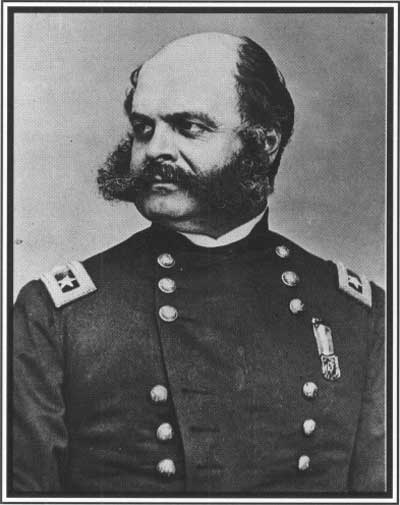
|
ONCE THE ARMY OF THE POTOMAC'S COMMANDER, AMBROSE BURNSIDE RETURNED TO
VIRGINIA IN 1864 AS HEAD OF THE INDEPENDENT NINTH CORPS. HIS TIMID
ATTACKS AT WILDERNESS AND SPOTSYLVANIA LOST HIM GRANT'S CONFIDENCE AND
ULTIMATELY LED TO HIS REPLACEMENT. (LC)
|
Upton cast about in vain for the support that he had been promised.
Mott, however, had already been repulsed, and Warren's soldiers were too
jaded from their earlier attacks against Laurel Hill to help. A few
Second and Fifth Corps units ventured into the Spindle fields and
momentarily breached Anderson's lines, but their gains were fleeting.
"Fruitless as the first," a Federal called the attack. As darkness
fell, Upton ordered his men back. "Bitter were the reproaches to which
both Russell and Upton gave utterance when upon Upton's return he gained
shelter of the woods," a Northerner recounted. "I sat down in the
woods," a soldier wrote, "and as I thought of the desolation and misery
about me, my feelings overcame me and I cried like a little child."
Although Grant did not realize it, his best opportunity for success
on May 10 lay in front of Burnside. Lee had weakened his eastern flank
by sending Mahone and Heth to the Po. During the afternoon, a single
Confederate division—Cadmus Wilcox's—guarded the Fredericksburg
Road, and a yawning gap separated Wilcox from Ewell in the salient.
With Sheridan off on his raid, Grant was deprived of his "eyes and
ears" and hence missed the opportunity that he had been seeking.
Burnside advanced timidly along the Fredericksburg Road around six
o'clock, met determined resistance from Wilcox, and decided to entrench
a quarter of a mile from the hamlet. Headquarters then fretted that
Burnside was too far advanced and ordered him back to the Ni. As Grant
conceded in his memoirs, withdrawing Burnside "lost to us an important
advantage." Even Burnside's soldiers were perplexed. "It was a profound
mystery to the men in the ranks, at the time, why such a movement should
have been made," a Northerner wrote.
But Grant remained optimistic as ever. Upton had failed, but perhaps
the attack held an important lesson. Lee's works were not invulnerable.
They could be breached if the attackers moved quickly, without pausing
to fire and reload. Upton had failed because he had lacked proper
support. What if an attack were launched similar to Upton's with an
entire corps? And what if the supporting troops consisted of the rest of
the Union army? Here, Grant concluded, lay the key to destroying
Lee.
|
|
